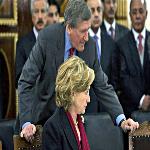14 December 2010

Photo: AP
Late ambassador Richard C. Holbrooke talking to U.S. Secretary of State Hillary Rodham Clinton at the Afghan Foreign Ministry after inauguration of Afghan President Hamid Karzai in Kabul (file photo – 19 Nov 2009)
U.S. special envoy to Afghanistan and Pakistan Richard Holbrooke died Monday at the age of 69 after undergoing heart surgery. The longtime diplomat's death drew reaction from around the world.
Words of praise showered from Islamabad to Brussels toward U.S. diplomat Richard Holbrooke, who died Monday in Washington.
U.S. Secretary of State Hillary Clinton saluted Holbrooke for pursuing a robust and determined diplomacy.
In Pakistan, President Asif Ali Zardari called him a friend. And in Brussels, NATO chief Anders Fogh Rasmussen saluted Holbrooke's vision and determination, while several European Union diplomats paid him tribute.
British State Minister for European Issues and NATO David Lidington saluted Holbrooke's role as chief architect of the 1995 Dayton peace agreement, which ended the war in Bosnia.
"Richard Holbrooke's vigorous diplomacy helped to end the war," Lidington said. "He helped to save lives and bring peace to a part of our continent wracked by civil war and bitter conflict and all Europeans are in his debt."
Even former Bosnian-Serb leader Radovan Karadzic, on trial for genocide charges, expressed sadness about Holbrooke's death.
For analysts like Anthony Dworkin of the European Council on Foreign Relations, the Dayton accord was perhaps Holbrooke's most important achievement.
"Holbrooke, I think, was really the one who led the shift to a more forceful and yet diplomatically effective response and his role in running the Dayton peace process was really a kind of exemplary importance in terms of bringing a settlement to the conflict," said Dworkin.
During his long career, Holbrooke left his footprint in almost every continent, working as a diplomat in Saigon during the Vietnam war, serving as ambassador to Germany, trying to resolve conflicts in Africa, and more recently serving as special representative to Afghanistan and Pakistan during the Obama administration.
Analyst Dworkin says that along with praise, Holbrooke also earned criticism for his forceful style and for cutting deals that were sometimes seen as unsavory.
"He made enemies but he also got things done and in that sense he was a very effective negotiator," Dworkin added.
But Dworkin says the complex and protracted conflict in Afghanistan shows the limits of Holbrooke's methods. And he believes Holbrooke's forceful and energetic style, which he says characterized past U.S. diplomacy, may be less effective in today's changing, more multilateral world.
But international affairs director Robin Shepherd, of the London-based Henry Jackson Society, believes Holbrooke's sometimes abrasive brand of diplomacy will always be in demand.
"Of course nuance is important, but really there are a lot of dangerous and difficult people in the world to deal with and you do need some tough negotiators to bang heads together," Shepherd said.
Holbrooke, he says, was a person who could do that.